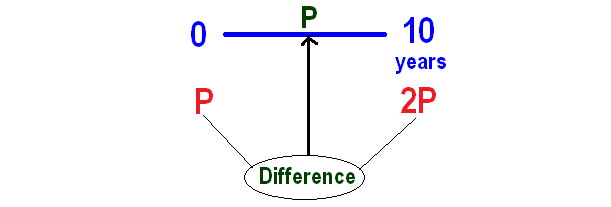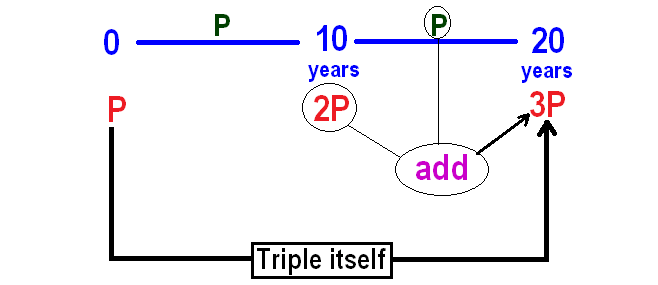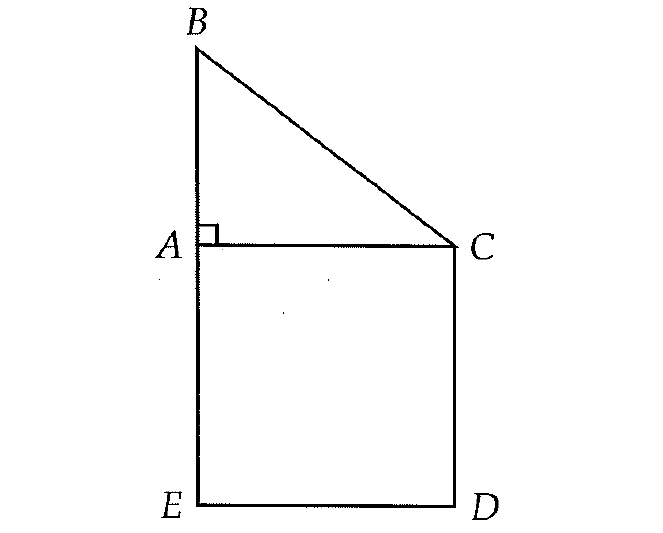SIMPLE INTEREST PROBLEMS
Problem 1 :
Find the simple interest on $6,900 at 16⅔% per year for 2 years.
Solution :
Formula for simple interest is
I = Prt
Here, P = 6900, n = 2, r = 16⅔% = 50/3%.
Substitute these values in the above formula.
I = 6900 ⋅ (50/3) / 100 ⋅ 2
= 6900 ⋅ 50/300 ⋅ 2
= 2300
Hence, the interest earned is $240.
Problem 2 :
If a sum of money is doubled in 10 years in simple interest, in how many years will it be tripled?
Solution :
Let P be the sum of money.
Given : P is doubled in 10 years.
Now we can calculate interest for ten years as given below.

From the above calculation, P is the interest for the first 10 years.
In simple interest, interest earned will be same for every year.
Interest earned in the next 10 years will also be P.
It has been explained below.

Hence, the sum of money will be tripled in 20 years.
Problem 3 :
If a sum of money amounts to $ 6200 in 2 years and $ 7400 in 3 years under simple interest, then find the principal.
Solution :
From the given given information we have the following points.
At the end of 2 years, we get $6200
At the end of 3 years, we get $7400
From the above two points, we can get the interest earned in the 3rd year.
It has been explained below.

In simple interest, interest will be same for every year.
So, we can calculate the principal as given below.

Hence, the principal is $3800.
Problem 4 :
If a sum of money produces $3900 as interest in 3 years and 3 months at 16% per year simple interest, find the principal.
Solution :
Formula for simple interest is
I = Prt ----(1)
Here, I = $3900, r = 16%, P = ?
The value of "t" must always be in "years". But in the question, it is given in both years and months.
To convert months into years, we have to divide the given months by 12.
Then, we have
t = 3 years 3 months
= 3 3/12 years
= 3¼ years
= 13/4 years
Substitute I = 3900, r = 16/100 and t = 13/4 in (1).
3900 = P ⋅ 16/100 ⋅ 13/4
3900 = P ⋅ 13/25
Multiply both sides by 25/13.
3900 ⋅ 25/13 = P
7500 = P
Hence, the required principal is $7500.
Problem 5 :
Arthur invests his inheritance of $24,000 in two different accounts which pay 6% and 5% annual interest. After one year, he received $1330 in interest. How much did he invest in each account?
Solution :
Let x be the amount invested in 6% account.
Then, the amount invested in 5% account is
= 24000 - x
Given : Total interest earned on both the accounts is $1340.
So, we have
Interest in 6% account + Interest in 5% account = 1330.
x ⋅ 6/100 ⋅ 1 + (24000 - x) ⋅ 5/100 ⋅ 1 = 1330
0.06x + (24000 - x)0.05 = 1330
0.06x + 1200 - 0.05x = 1330
0.01x + 1200 = 1330
Subtract 1200 from both sides.
0.01x = 130
Divide both sides by 0.01.
x = 130/0.01
x = 13000
And also,
24000 - x = 24000 - 13000
24000 - x = 11000
Hence, the amount invested in 6% account is $13,000 and in 5% account is $11,000.
Problem 6 :
Mr. Garret invested twice as much money at 6% as he did at 7%. After one year, his earnings at 6% were $95 more than his earnings at 7%. Find the amount invested at each rate.
Solution :
Let x be the amount invested at 7% rate.
Then, the amount invested in 6% rate is
= 2x
Interest earned after 1 year at 7% rate is
= x ⋅ 7/100 ⋅ 1
= 0.07x ----(1)
Interest earned after 1 year at 6% rate is
= 2x ⋅ 6/100 ⋅ 1
= 0.12x ----(2)
Given : Earnings at 6% were $95 more than his earnings at 7%.
That is, earnings in (2) were $95 more than the earnings in (1).
So, we have
(2) - (1) = 95
0.12x - 0.007x = 95
0.05x = 95
Divide both sides by 0.05
x = 95/0.05
x = 9500/5
x = 1900
And also,
2x = 2 ⋅ 1900
2x = 3800
Hence, the amount invested at 7% rate $1900 and at 6% rate is $3800.
Kindly mail your feedback to v4formath@gmail.com
We always appreciate your feedback.
©All rights reserved. onlinemath4all.com
Recent Articles
-
Digital SAT Math Problems and Solutions (Part - 124)
Mar 11, 25 10:10 AM
Digital SAT Math Problems and Solutions (Part - 124) -
SAT Math Resources (Videos, Concepts, Worksheets and More)
Mar 11, 25 10:08 AM
SAT Math Resources (Videos, Concepts, Worksheets and More) -
Digital SAT Math Problems and Solutions (Part - 125)
Mar 11, 25 10:03 AM
Digital SAT Math Problems and Solutions (Part - 125)
